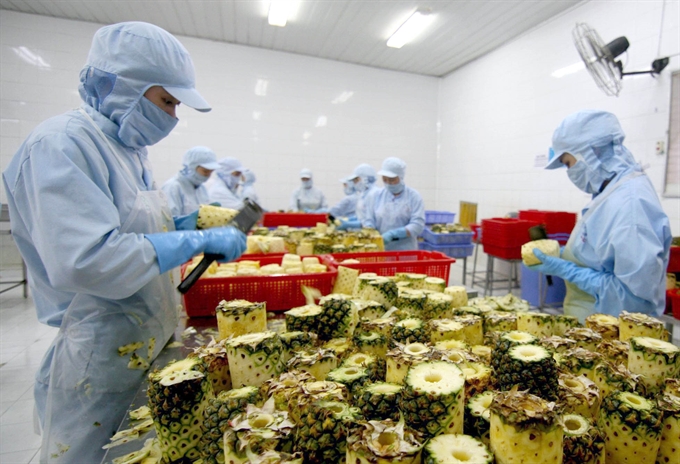 Economy
Economy

Fruitful economic stabilisation and restructuring along with ensured social welfare are the prerequisites for successful international economic integration, Deputy Prime Minister Vương Đình Huệ said.
 |
| Agricultural products being processed at An Giang Company in southern An Giang Province. With the ASEAN Economic Community already formed and 13 FTAs signed, Viet Nam has free trade relations with 55 countries, including all G7 nations and 15 of the G20 countries. — VNA/VNS Photo |
HÀ NỘI — Fruitful economic stabilisation and restructuring along with ensured social welfare are the prerequisites for successful international economic integration, Deputy Prime Minister Vương Đình Huệ said.
Huệ told a workshop on “Việt Nam’s participation in TPP and EVFTA: Seizing the Opportunities of New-Generation Free Trade Agreements” that international integration, which focusses on international economic integration, has been a consistent and long-term policy of the Vietnamese Party and State.
With the ASEAN Economic Community already formed and 13 FTAs signed, Việt Nam has free trade relations with 55 countries, including all G7 nations and 15 of the G20 countries.
Those FTAs, especially the Trans-Pacific Partnership (TPP) agreement and the EU- Việt Nam FTA (EVFTA), are considered the agreements of the 21st century. They have opened up huge opportunities for Việt Nam, particularly in trade and investment, he noted.
The Vietnamese government will submit the TPP to the National Assembly for ratification in the next few months. It has reviewed the legal system and will overhaul existing regulations or issue new ones to realise integrational commitments and create the right conditions for successful integration.
The Deputy PM quoted Resolutions No 19 and 35 as examples of the Cabinet’s efforts. While Resolution No 19 aims to improve the business climate and national competitiveness, the Government has asked ministries and localities to robustly implement Resolution No 35 on supporting Vietnamese businesses.
Việt Nam hopes to have at least 1 million enterprises by 2020, almost doubling the current figure, he added.
He said the Vietnamese Government is determined to build a transparent and clean government, maintain macro-economic stability and accelerate economic restructuring in order to better serve enterprises and the people. In return, businesses also have to pro-actively move ahead on the basis of renovation and creation.
World Bank Regional Vice President for East Asia and the Pacific Victoria Kwakwa said that integration into the region and the world has played a crucial role in Việt Nam’s economic transition. The country has become an FDI magnet and a growing export economy.
Việt Nam would remain attractive to foreign investment and continue to achieve a good growth rate thanks to strong exports. It now has a great chance to capitalise on benefits generated by the FTAs like the TPP and the EVFTA.
Not only containing traditional market access issues in regards to goods, trade services and investment, the two trade pacts also cover new areas, either not covered by or go much deeper than those signed on the framework of the World Trade Organisation, such as e-commerce, labour, environment, small- and medium-sized enterprises, State-owned enterprises and regulatory coherence, Kwakwa said.
She said these new-generation agreements are expected to generate considerable benefits for Việt Nam in terms of trade, investment, growth and job creation, but they are also accompanied by a number of big challenges and, without careful implementation of commitments, many of the benefits might pass the country by.
She added that the World Bank Group has pledged to help Việt Nam optimise the new-generation FTAs to achieve a high growth rate, create and share prosperity, and sustainably provide high-quality jobs for its young population.
At the workshop, Deputy Minister of Industry and Trade Trần Quốc Khánh gave a briefing on the situation of Việt Nam’s TPP and EVFTA ratification as well as its plan to enforce the two agreements.
The participants discussed issues such as grasping opportunities and minimising risks from the TPP and the EVFTA, the road map for reforming trade-related laws, and the FTAs’ significance in local agriculture. – VNS




